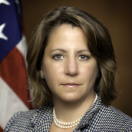
The President’s number one priority is the safety and security of the American people.
Since 9/11, our nation has worked to use all elements of national power to deter, defeat and disrupt the type of attack we suffered that tragic day. We have hardened our defenses at airports and financial centers and across critical infrastructure. At home and overseas, our tireless law enforcement, intelligence, and military professionals have stopped countless terrorist plots.
But the terrorist threat continues to evolve. We are in a new phase in our fight against terrorism and we face an enemy that prioritizes recruitment and radicalization towards violence and terrorist groups are using technology to spread their hateful ideology to recruit young people across continents and here at home to travel to fight or undertake less complicated acts of violence like mass shootings. There’s no question that the tragedies in Paris and San Bernardino underscore the urgency of our efforts defeat terrorist groups like ISIL.
At the President’s direction, we have intensified our efforts to confront the terrorist threat – not only on the battlefield but before their vile message and propaganda drives would-be terrorists to violence. Countering violent extremism at home and abroad means doing three things:
- Empowering communities: At its core, countering violent extremism depends on building trust between communities, civil society actors, and governments; and broadening the sense of shared responsibility to prevent at risk people from turning to violence.
- Combatting terrorist messaging: We must rebut and undermine radical jihadists and other violent extremist messaging and offer positive alternative narratives. However, our efforts will be the most effective when they focus on amplifying authentic voices from at-risk communities, religious leaders, and former violent extremists, and when they are done in close collaboration with the private sector, particularly media and technology companies. We need to enlist the help of our most innovative minds in our shared goal of protecting our nation.
- Understanding and addressing causes of radicalization: At the most fundamental level, terrorist organizations mobilize people to violent action by capitalizing on the grievances of those who feel underrepresented and left behind. But we need to understand better what drives individuals to radicalization and what kinds of interventions will work to stop people before they are drawn down a dark path.
Earlier this year at a gathering of the United Nations General Assembly with representatives of 200 nations and 120 civil society groups from across the globe, the President said:
It is not going to be enough to defeat ISIL in the battlefield. We have to prevent it from radicalizing, recruiting and inspiring others to violence in the first place. And this means defeating their ideology. Ideologies are not defeated with guns, they’re defeated by better ideas -- a more attractive and compelling visionPresident Obama
We can and must get better, and over the last year we have made progress. Here’s what you need to know about our efforts to counter violent extremism at home and abroad:
At home, the Department of Homeland Security is leading a new Countering Violent Extremism Task Force. Experts from the Department of Justice, Federal Bureau of Investigation, the National Counterterrorism Center, and other agencies will work hand-in-hand in one office to ensure that we are doing everything we can in communities to prevent radicalization.
The United States Government depends on a range of voices in confronting the message of terrorists, who seek to strike across the world. That is why the State Department announced a new Global Engagement Center, which will focus on empowering credible non-governmental voices to counter the evil message of groups like ISIL, al-Qaida, and others. Much like our efforts to train the Iraqi Security Forces are essential to the military battle against ISIL, these partner voices are best positioned to fight ISIL in the information space – the battle of ideas.
As the threat from terrorism evolves, so too will the United States’ efforts to combat it. In his address to the nation, the President noted:
The threat from terrorism is real, but we will overcome it. We will destroy ISIL and any other organization that tries to harm us. Our success won’t depend on tough talk, or abandoning our values, or giving into fear. That’s what groups like ISIL are hoping for. Instead, we will prevail by being strong and smart, resilient and relentless, and by drawing upon every aspect of American power.President Obama
The new phase of our fight against the vile ideology that groups like ISIL spread cannot be defeated only through our military might. The fight also calls for the power of our ideas, the power of our people, and our combined power with our partners.


